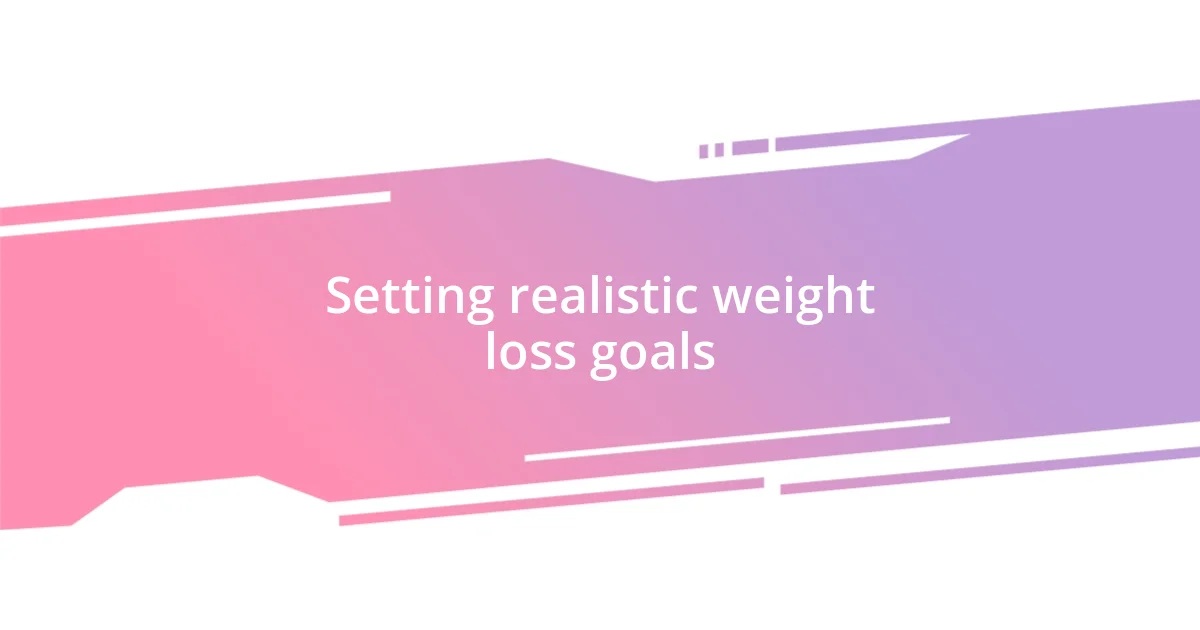Key takeaways:
- Sustainable weight loss involves creating a balanced lifestyle, not just focusing on quick fixes or strict diets.
- Setting realistic, SMART goals and celebrating small milestones helps maintain motivation and accountability.
- Adapting strategies based on personal needs and listening to your body is vital for long-term success in weight loss.

Understanding sustainable weight loss
Sustainable weight loss is all about finding a balance that works for you, and I’ve learned that it isn’t just about the numbers on a scale. I remember feeling overwhelmed by strict diets that promised quick results but left me frustrated and discouraged when the weight crept back on. How many times have you found yourself in a similar situation, hopping from one diet fad to another, only to feel like you’re chasing your own tail?
What really clicked for me was understanding that it’s okay to indulge occasionally and enjoy food without guilt. I think back to those family gatherings where the food was a celebration, a moment to connect. I realized that my approach needed to embrace those moments rather than shy away from them in fear of losing progress. Isn’t it refreshing to think that you can have your cake and still pursue your goals?
Creating a lifestyle change rather than a temporary fix has allowed me to see weight loss as a journey, not a race. I often reflect on how small, consistent changes—like incorporating more vegetables into my meals or taking short walks—can make a huge difference over time. Have you noticed how even the smallest adjustments can gradually shift your mindset towards healthier choices? It’s all about progress, not perfection, and that realization has been liberating for me.

Setting realistic weight loss goals
Setting realistic weight loss goals is an essential part of any sustainable weight loss journey. I remember when I first set goals that were overly ambitious; I aimed to lose 20 pounds in a month. The excitement quickly turned into disappointment when I only lost half that. I discovered that setting smaller, achievable goals, like losing half a pound a week, kept me motivated and allowed for gradual changes in my routine. Have you ever felt the weight of unmet expectations? It can be disheartening, but adjusting my goals helped me stay on track.
I’ve learned to embrace SMART goals—specific, measurable, achievable, relevant, and time-bound. For instance, instead of vaguely stating, “I want to get fit,” I would say, “I will walk 30 minutes a day, five days a week, for the next month.” That kind of clarity not only made it easy to measure my progress but also made me accountable to myself. How does it feel to pinpoint what you really want? For me, it instilled a sense of purpose in every step I took toward my goal.
Reflecting on my journey, I often think about how important it is to be flexible. Life happens! There were times I missed workouts or indulged in a rich dessert. Instead of kicking myself, I learned to adjust my goals and set new ones to accommodate those moments. By focusing on consistency rather than perfection, it became easier to navigate obstacles without feeling defeated.
| Goal Type | Description |
|---|---|
| Short-term goals | Focus on immediate, achievable changes like drinking more water daily or taking small walks. |
| Long-term goals | Set broader objectives like reaching a specific weight or adopting a healthier lifestyle over several months. |
| S.M.A.R.T. goals | Specific, Measurable, Achievable, Relevant, and Time-bound goals provide clarity and accountability. |

Developing a balanced meal plan
When I started thinking about a balanced meal plan, I realized it wasn’t just about cutting calories or saying no to things I enjoyed. It was more about discovering what worked for my body and my tastes. I began experimenting with different foods and combos, which turned out to be a delightful journey. I still remember the joy of finding that perfect avocado toast with poached eggs—simple, nourishing, and surprisingly satisfying. Have you ever experienced the pleasure of enjoying a meal that feels indulgent yet healthy?
To help guide your meal planning, consider these key elements:
- Variety: Include a mix of proteins, whole grains, healthy fats, and plenty of colorful vegetables.
- Portion Control: Listen to your body’s hunger cues, and serve appropriate portions.
- Mindful Eating: Take time to savor each bite, which can enhance satisfaction and prevent overeating.
- Meal Prep: Dedicate a few hours each week to prepare meals in advance, reducing the temptation to grab unhealthy options.
- Balance: Allow room for occasional treats, ensuring that it doesn’t lead to feelings of deprivation.
I found that planning my meals for the week not only saved time but also made sticking to my goals much easier. It helped me avoid the dreaded late-night snack attacks and last-minute takeout. You know those moments when you find yourself reaching for ice cream because there’s nothing ready? By having meals prepared, I often felt energized and focused, ready to tackle my day without the stress of what to eat next.

Incorporating regular physical activity
Incorporating regular physical activity was a game-changer for me. Initially, I viewed exercise as a chore rather than a necessity. Then one day, I decided to try hiking with a friend. The exhilaration of being surrounded by nature and the thrill of reaching the summit made me realize how much I enjoyed moving my body. Have you ever found joy in surprising places? For me, discovering activities that felt less like work and more like fun was the key to making physical activity a part of my everyday life.
As I progressed in my journey, I began to explore different types of workouts. From dancing in my living room to trying out yoga classes, each activity offered a unique challenge and experience. I particularly loved how these sessions lifted my mood. At times, I would enter a class feeling particularly sluggish, yet leave brimming with energy and positivity. This helped me understand that physical activity didn’t just benefit my physical body but also nurtured my mental health. Have you ever left a workout feeling lighter? That’s because movement really can uplift your spirit.
I also developed a habit of incorporating more movement into my daily routine. Instead of taking the elevator, I’d opt for the stairs, or I’d walk to the grocery store instead of driving. In small, often unnoticed ways, I found myself becoming more active, which gradually added up. There were days when my schedule was jam-packed, but even squeezing in a quick 10-minute dance break felt refreshing. It’s fascinating how little changes can create a ripple effect. What about you? Have you noticed how something as simple as a few extra steps can brighten your day? That’s the beauty of regular physical activity; it truly becomes a sustainable part of your lifestyle.

Staying motivated throughout the journey
Staying motivated throughout my weight loss journey was sometimes a real juggling act. I learned that setting small, achievable goals kept my spirits high. For example, when I aimed to lose just one pound a week instead of thinking about the long-term weight target, it felt more manageable, almost like a fun challenge. Do you often find yourself overwhelmed by big goals? I certainly did, but breaking them down into bite-sized pieces made all the difference.
Another strategy that worked wonders for me was celebrating my milestones, no matter how small. After I reached a mini-goal, like fitting into a pair of jeans I hadn’t worn in years, I treated myself to a relaxing spa day. It felt rewarding and helped reinforce my motivation. Have you ever experienced a moment where rewarding yourself felt like the cherry on top of your hard work? Giving myself permission to enjoy those moments created a positive feedback loop; each celebration pushed me to strive for the next.
I also discovered the power of community in maintaining motivation. Joining a local weight loss support group was a turning point for me. Sharing my ups and downs with others who were on similar paths made the journey feel less isolating. Have you ever found strength in a shared experience? Those stories of success and struggle inspired me to keep going, reminding me that I wasn’t alone in this. Plus, listening to others’ journeys sparked new ideas for strategies and motivation techniques I hadn’t considered before. That sense of camaraderie truly enriched my experience.

Tracking progress effectively
Tracking my progress effectively was crucial for staying on top of my weight loss journey. I discovered that using a simple app helped me log my meals and workouts, providing a clear picture of my efforts. Do you know how motivating it can be to see what you’ve accomplished visually? Whenever I noticed those small victories stacking up, it reignited my excitement and reminded me that I was moving in the right direction.
In addition to using technology, I found that keeping a journal was an enriching experience. Writing down my thoughts, feelings, and the challenges I faced ensured that I wasn’t just counting numbers, but also reflecting on my emotional journey. Have you ever considered journaling as a form of self-discovery? It certainly became a safe space for me, where I could vent frustrations one day and celebrate triumphs the next. Each entry revealed patterns in my behavior that I could either celebrate or work on improving.
I also made it a point to weigh myself consistently but without letting it dictate my mood. It sounds simple, yet those weekly weigh-ins bridged the gap between my internal feelings and actual results. I still remember the week I didn’t lose any weight, but my clothes felt looser. I had to remind myself that progress isn’t always linear. Isn’t it interesting how our bodies respond in ways we might not expect? That perspective helped me appreciate the full scope of my progress—both mentally and physically.

Adapting strategies for long-term success
Adapting my strategies was essential for long-term success in my weight loss journey. I found that as I progressed, my needs and priorities evolved, too. For instance, what worked during my initial weight loss phase might not hold the same effectiveness now that I’ve shifted my focus to maintenance. Have you ever noticed how our approaches need to evolve as our lives do? Adapting to those changes not only helped keep my routine fresh but also aligned with my evolving goals.
I remember experimenting with different types of physical activity as my interests shifted. Initially drawn to high-intensity workouts, I gradually discovered a love for yoga and outdoor hikes. Each new activity reignited my enthusiasm and added variety to my routine. Can you recall a time when trying something new opened up a pathway to joy and connection? Those moments of discovery motivated me to stay active, making fitness feel less like a chore and more like an enjoyable experience.
Finally, I realized that listening to my body played a crucial role in adapting my strategies. Some days, I craved vegetables, while other days I needed something richer. Recognizing these signals made my approach more intuitive. How often do we overlook our body’s cues in pursuit of rigid routines? Embracing flexibility allowed me to enjoy my food without guilt and supported my overall well-being. This approach helped me understand that sustainable weight loss isn’t just about discipline; it’s about creating a nourishing and balanced relationship with myself.














